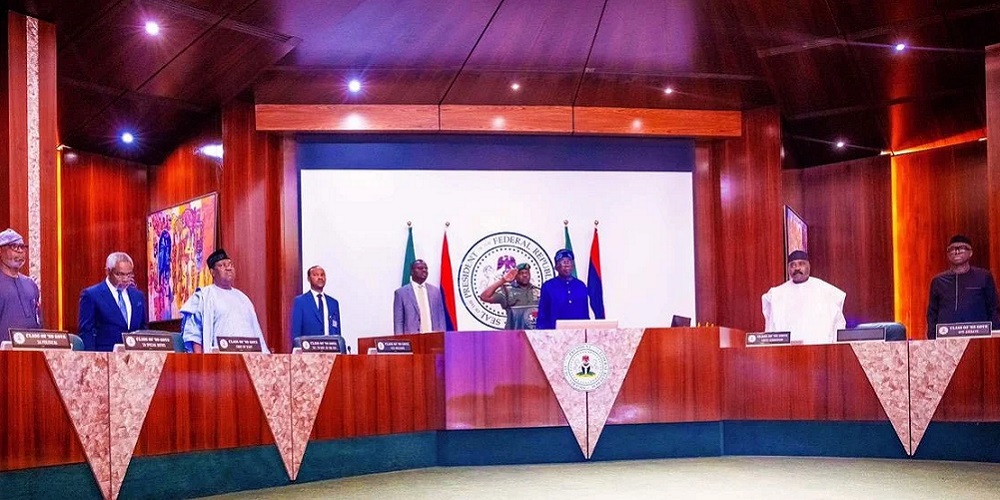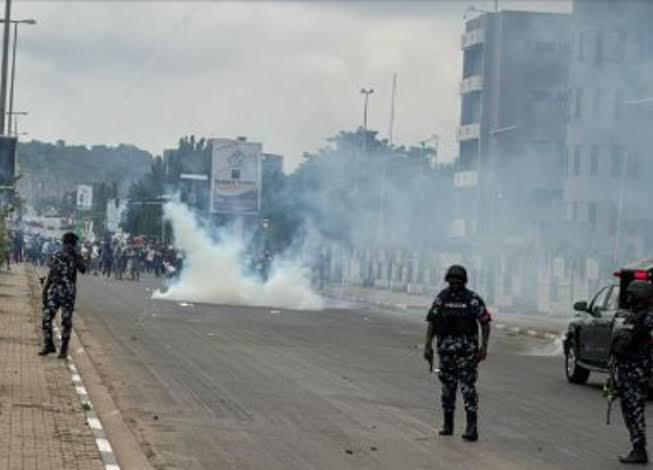News
FEC Approves N4.2trn for Lagos-Calabar Coastal Road, Other Major Road Projects Nationwide

The federal government has approved road infrastructure contracts worth N4.2 trillion, covering major highways and bridges across Nigeria, including the second phase of the Lagos-Calabar Coastal Road. Minister of Works, Senator David Umahi, disclosed this to newsmen yesterday in Abuja at the end of the Federal Executive Council (FEC) meeting presided by President Bola Tinubu.
According to Umahi, the projects are spread over several states, with a focus on enhancing connectivity, improving road safety, and supporting economic growth.
FEC also approved road construction projects worth N159.5 billion for the Federal Capital Territory (FCT), targeting infrastructure development within the city and its satellite towns.
Minister of State for the FCT, Mariya Mahmoud Bunkure, disclosed the approvals during the post-FEC media briefing, where she detailed the major projects aimed at improving accessibility and urban development.
The federal government equally unveiled an ambitious plan to position the country’s creative and tourism sectors as key drivers of economic growth, with the potential to contribute at least $100 billion to the nation’s Gross Domestic Product (GDP) and creating two million jobs. Minister of Art, Culture, Tourism, and Creative Economy, Hannatu Musawa, made this known to newsmen yesterday after the FEC meeting.
The contracts for the nationwide road infrastructure included new constructions, rehabilitation of deteriorating sections, and expansion of critical routes, with many projects shifting towards concrete pavement for durability.
The largest allocation went to the Lagos-Calabar Coastal Highway, with FEC approving N1.334 trillion for the construction of a 130-kilometre dual carriageway. This covers 65 kilometres in Lagos and Ogun states, and an additional stretch starting from Calabar through Akwa Ibom.
The project will be executed under an Engineering, Procurement, and Construction (EPC) framework, with a 10-year maintenance plan.
FEC also approved N470.9 billion for the Delta State access road and N148 billion for the Anambra State access road to the Second Niger Bridge.
According to the minister, both roads will be constructed using concrete to ensure long-term resilience.
He explained, “Lagos-Ibadan Expressway (Phase 2, Section 1) got N195 billion approval to undergo reconstruction under the Presidential Infrastructure Development Fund (PIDF), focusing on improving traffic flow and reducing congestion along the busy corridor.
“The Abuja-Kano road project, previously handled by Julius Berger, has been restructured into two lots following contract termination, including Lot 1 (FCT-Niger boundary): Expanded by 5.71 kilometres towards Kogi State and Lot 3 (Kano section): extended by 17 kilometres.”
Umahi said the total length of the project was now 118 kilometres, with solar street lighting planned throughout. Section 1 will be built with concrete, while Section 3 will use asphalt.
The reconstruction of three sections of the Lokoja-Benin road will be done entirely with concrete for durability at N305 billion, including Obajana to Benin (Section I): N64 billion; Auchi to Edo (Section II): N110 billion; and Benin Airport area (Section III): N131 billion.
A contract worth N3.571 billion was approved for an extensive structural assessment of the Third Mainland Bridge and Carter Bridge in Lagos. Umahi said this evaluation aimed to prevent further deterioration, building on findings from assessments conducted in 2009 and 2013, which identified progressive structural decay.
FEC also approved Ado-Ekiti–Igede Road Project (N5.4 billion) as part of a series of smaller road upgrades in Ekiti State to improve local connectivity and reduce travel time.
It approved N22 billion for the Onitsha-Owerri Expressway. The minister said the expressway will undergo rehabilitation to ease movement between Anambra and Imo states, and foster trade within the South-east region.
Musasa-Jos Route (Kaduna State) was approved at N18 billion to enhance road safety and reduce travel time between Kaduna and Plateau states.
Abia and Enugu States Road Project got N12.75 billion in a joint project that will focus on key sections within the budget limits, and address long-standing infrastructure gaps.
Umahi emphasised that most new projects, including the Lokoja-Benin and Abuja-Kano roads, will be constructed using reinforced concrete pavement instead of traditional asphalt.
He said, “Concrete roads are not only more durable but also cost-effective in the long run. In fact, the cost of these concrete projects is significantly cheaper than previous asphalt-based contracts rejected by some contractors.”
The minister addressed concerns about terminated contracts, particularly with Julius Berger, clarifying that the government has negotiated cost-saving measures while equipment from previous contractors will be repurposed to avoid unnecessary mobilisation costs.
Umahi also dismissed recent reports about fake companies being awarded contracts, and assured Nigerians that due diligence was followed in selecting credible contractors.
According to him, “We’ve resolved misunderstandings with key stakeholders, including media organisations, to ensure transparency. The companies handling these projects are legitimate and well-equipped.
“This is not just about roads; it’s about driving Nigeria’s economic transformation. We are committed to delivering durable, cost-effective infrastructure that will stand the test of time.”
FEC also approved road projects worth N159.5 billion for the FCT, focussing on infrastructure development within Abuja and its satellite towns.
The FCT minister of state detailed the five major projects aimed at improving accessibility and urban development during the post-FEC media briefing.
She said the projects included Bus Terminal Access Road, Mabushi, awarded to Messrs SETRACO Nigeria Limited at the cost of N30.97 billion, with a completion period of 18 months.
The council approved Arterial Road from Wuye District to Ring Road II, awarded to Messrs Arab Contractors Nigeria Limited at the cost of N62.5 billion, with a completion period of 20 months.
Bunkure stated, “Also approved is Kuje-Gwagwalada Dual Carriageway Construction to Messrs Gilmor Engineering Nigeria Limited at N7.49 billion; the rehabilitation of Old Keffi Road (Kado Village to Dei Dei), awarded to
Messrs Lubric Construction Company Limited at N26.87 billion, with a completion time of 18 months.
“There is also a contract for the construction of access road to Renewed Hope Cities and Estates (Kasana West District) to Messrs Lubric Construction Nigeria Limited in the sum of N31.66 billion, with a completion time of 18 months.”
The minister emphasised that the projects aligned with the FCT administration’s commitment to urban expansion, improved road networks, and enhanced connectivity across Abuja.
She said the contracts were awarded to reputable construction firms with track records of delivering quality infrastructure projects.
Bunkure assured residents that the projects would be completed within the stipulated timelines to enhance mobility and economic development in the capital city.
Equally on Monday, the federal government unveiled a plan to position Nigeria’s creative and tourism sectors as key drivers of economic growth, with the potential to contribute at least $100 billion to GDP and create over two million jobs.
The art, culture, tourism, and creative economy minister told the post-FEC media briefing that at the heart of the plan was the establishment of Creative and Tourism Infrastructure Corporation (CTIC), a special-purpose vehicle designed to invest in and develop critical infrastructure for Nigeria’s creative and tourism industries.
The initiative, approved by the FEC, will operate under a public-private partnership (PPP) framework, and attract both local and international investors to support its ambitious goals.
“The CTIC is not just a project; it’s a transformative agenda,” Musawa stated.
“We aim to unlock the immense potential of Nigeria’s creative and tourism industries, enhance economic growth, and project Nigeria’s cultural soft power globally,” she added.
The minister outlined the government’s targets for the CTIC to include: contributing at least $100 billion to Nigeria’s GDP; creating over two million jobs, with a focus on Nigeria’s vibrant youth population; and developing world-class infrastructure to support talent development, cultural preservation, and tourism growth
“This is a deliberate strategy by President Bola Tinubu’s administration to diversify the economy beyond oil and tap into Nigeria’s vast creative and cultural wealth,” Musawa said.
The minister emphasised that while Nigeria boasted a wealth of creative talent and cultural heritage, lack of supporting infrastructure had been a major barrier to full realisation of the sector’s economic potential.
Musawa said, “Everyone talks about Nigeria’s creativity. Our content is globally celebrated, from Nollywood to Afrobeat. But what we lack is the infrastructure to support and sustain this growth.”
She stressed, “Imagine the impact if events, like December’s ‘Detty December’ in Lagos, were backed by world-class infrastructure. The value would be exponential.”
Musawa revealed an array of projects under consideration to drive the sector’s growth, including: Abuja Resort Range and Abuja Creative City; revitalisation of Yankari Game Reserve; development of 5,000 new cinema screens nationwide; Wole Soyinka Centre for African Arts in Lagos; and a National Digital Distribution Network for creative content.
Others were upgrading the National Gallery of Art and expanding the National Arena to 100,000-seat capacity; establishment of a Nigerian National Museum in Abuja; positioning Nollywood as a global film destination with dedicated production hubs; and a world-class music arena to support Nigeria’s booming music industry.
“It’s unthinkable that Nigeria, the Giant of Africa, doesn’t have a national museum in its capital city. We’re going to change that,” Musawa declared.
She also highlighted ongoing engagements with development partners and stakeholders worldwide to secure investments and adopt innovative financing models for the CTIC projects.
Musawa explained, “The government is intentional about this. We’re not just waiting for foreign investments; we’re putting domestic financing structures in place and creating an environment where the private sector can thrive.
“Today marks the beginning of a journey to not just build infrastructure, but to shift the national mind-set about the economic power of culture, creativity, and tourism.”
The minister added, “This is a new dawn for Nigeria’s creative and tourism industries.”
News
NAFDAC unveils tools to check fake drugs in N’East

By Francesca Hangeior
The National Agency for Food and Drug Administration and Control has launched innovative mobile technologies aimed at combating counterfeit drugs in Nigeria’s North-East region.
The a two-day sensitisation workshop in Gombe, stakeholders from various healthcare sectors were introduced to the “Scan 2 Verify” and “Green Book App” tools designed to authenticate medicines and ensure public safety.
Speaking on Wednesday, NAFDAC’s Director-General, Professor Mojisola Adeyeye, who was represented by the Director of Post-Marketing Surveillance, Bitrus Fraden, reassured participants that all drugs registered by NAFDAC are safe and available only through legitimate outlets.
Adeyeye further explained that the Green Book App serves as a digital registry listing certified medicines approved by the agency.
“Users can quickly verify a drug’s authenticity, with any product not listed being deemed counterfeit,” Adeyeye said.
The workshop, which targeted key stakeholders, including pharmaceutical vendors, medical doctors, and healthcare professionals, harped on the need to adopt the technologies to ensure only genuine medicines reach consumers.
Participants such as patent medicine dealers and shop owners praised NAFDAC for the timely initiative.
Yakubu Yusuf and Hauwa Musa, participants at the workshop, described the training as a significant step toward resolving the challenges of counterfeit drugs.
NAFDAC also emphasised its ongoing efforts to shut down counterfeit drug markets in Lagos, Onitsha, and other parts of the country, reaffirming its commitment to public health and safety.
The agency highlighted the importance of public awareness in the fight against fake drugs, urging individuals to verify medicines before use and make informed health choices.
News
Tinubu hails Dangote’s World Bank appointment

By Francesca Hangeior
President Bola Ahmed Tinubu has congratulated industrialist, Aliko Dangote, on his appointment to the World Bank’s prestigious Private Sector Investment Lab, describing it as a fitting recognition of his transformative contributions to Africa’s private sector.
In a statement by his Special Adviser on Information and Strategy, Mr. Bayo Onanuga, Tinubu commended the billionaire businessman and President of the Dangote Group, stating that his inclusion in the global economic initiative is well-deserved.
“The President describes the appointment as apt, given Dangote’s rich private sector experience, strategic investments, and many employment opportunities created through his Dangote Group,” the statement said.
The World Bank announced Dangote’s appointment on Wednesday as part of a broader effort to expand the reach and impact of its Private Sector Investment Lab.
The Lab, established to harness private capital and scale up investment in developing economies, is entering a new phase that emphasizes job creation as a key development strategy.
Dangote joins other global business leaders on the panel, including Bill Anderson, CEO of Bayer AG; Sunil Bharti Mittal, Chair of Bharti Enterprises; and Mark Hoplamazian, President and CEO of Hyatt Hotels Corporation.
The Bank said the newly expanded membership reflects its strategic focus on leveraging proven private sector leaders to drive employment growth and innovation across emerging markets.
Tinubu urged Dangote to bring his signature blend of vision and innovation to the World Bank role, expressing confidence that he would make a lasting global impact.
“President Tinubu urges Dangote to bring to bear on the World Bank appointment his transformative ideas and initiatives to impact the emerging markets across the world fully,” the statement said.
Dangote, Africa’s richest man, leads one of the continent’s most diversified industrial groups. The Dangote Group spans sectors such as cement, fertilizer, salt, sugar, and oil and gas.
Its $20 billion petroleum refinery and petrochemical complex, recently inaugurated in Nigeria, is considered the continent’s most ambitious private sector investment and a game-changer for regional energy security.
With his new role at the World Bank, Dangote is expected to help guide efforts to channel private investments into sectors critical to sustainable growth and economic resilience in the developing world.
News
Police arrest eight suspects over cult-related killings in Lagos

By Francesca Hangeior
Eight suspected cultists allegedly involved in several cult-related killings within Yaba College of Technology and its environs have been arrested by tactical operatives of the Lagos State Police Command.
One Beretta pistol, four 9mm cartridges, one cartridge, two battle axes, and two cutlasses were recovered, according to the police.
Spokesman for the Lagos State Police Command, CSP Benjamin Hundeyin, described the operation which took place on April 29, 2025, as intelligence-led.
He gave the identities of the arrested suspects as: Adeyemo Abdulsamad, alias Cloud, 24; Afeez Enitan, 28; Ayomide Daniel, aged 30; Olamilekan Adeagbo, alias Skinny, 26; Mayor Samson, aged 38; Basit Ishola, aged 20; Quadri Sikiru, aged 26; and Mariam Salihu, a female, 23 years old.
Hundeyin said, “Investigation is still in progress to unravel the full extent of the suspects’ involvement in cult-related activities. Members of the public are assured that the suspects will be made to face the full wrath of the law.
“The Commissioner of Police, Lagos State Command, CP Olohundare Jimoh, while commending the swift response and excellent work of the Command’s tactical teams and Eko Strike Force, who carried out the operation, urges the public to remain vigilant and report any suspicious activity to the police for appropriate action. He equally assures the public that the Command will continue to work tirelessly to ensure the safety and security of all residents and visitors to Lagos State.”
-

 News24 hours ago
News24 hours agoJust in: Popular Nigerian billionaire, E-Money nabbed by EFCC
-

 Metro8 hours ago
Metro8 hours agoGunmen storm University of Benin teaching hospital, kill doctor
-

 Politics20 hours ago
Politics20 hours agoJust in: Ex- Gov Okowa accepts betraying Southern Nigeria, laments running with Atiku
-

 Metro8 hours ago
Metro8 hours agoFCTA destroys 601 motorbikes over violations
-

 News20 hours ago
News20 hours agoBoko Haram Kill Mourners, Kidnap Others In Borno
-

 News8 hours ago
News8 hours agoJust in: FG declares tomorrow public holiday
-

 News20 hours ago
News20 hours agoDeputy Speaker Leads Defection of PDP Stalwart Chris Igwe, 13,000 Followers to APC In Abia
-

 News1 hour ago
News1 hour agoJUST IN: Major General Paul Ufuoma Omu Rtd, dies at 84


















